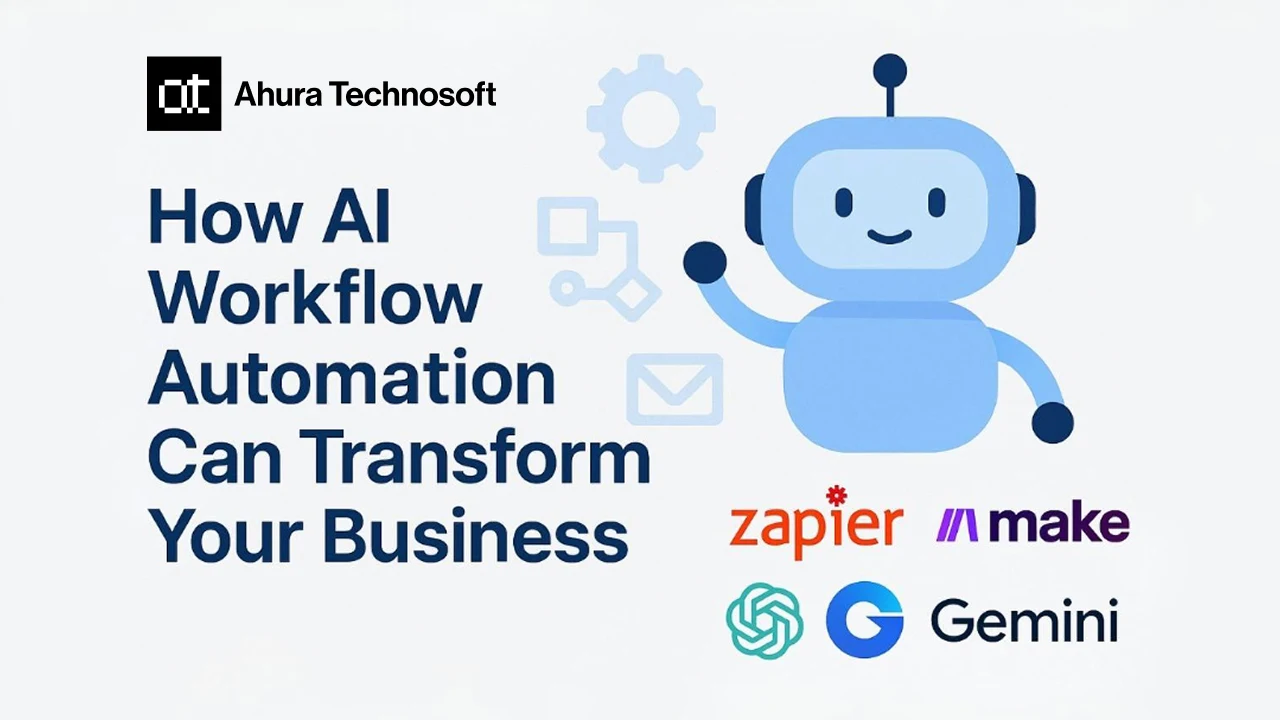What is AI Workflow Automation?
AI workflow automation means using software – often with machine learning or AI capabilities – to automatically execute business processes. Think of it as having a virtual assistant that can:
-
Handle Customer Messages:
Chatbots can answer common questions 24/7, freeing you from repetitive support tickets.
-
Automate Data Tasks:
AI can input data (e.g. sales figures, customer info), schedule email campaigns, or update spreadsheets automatically.
-
Personalize Marketing:
Tools can generate content, segment customers, or send tailored offers based on AI analysis of behavior.
-
Manage Operations:
From reordering inventory when stock is low to scheduling employees, AI can trigger and track routine processes.
The result? As one expert notes, 95% of professionals say AI tools help them spend less time on manual, repetitive tasks . That frees up staff to do the strategic work that really grows the business.
Key Benefits for Small Businesses
Adopting AI workflow automation offers many advantages, such as:
-
Boosted Productivity:
Automating workflows means tasks get done faster. For example, automating invoicing or report generation can save hours each week, allowing you to serve more customers without extra staff. “Workflow automation takes over repetitive tasks, freeing up your team to focus on more strategic work”.
-
Cost Savings:
Less manual work means fewer errors and lower labor costs. Though there’s an upfront investment in tools, over time you’ll spend less on overtime or fixing mistakes
-
Improved Accuracy:
AI systems don’t get tired. They execute tasks consistently, reducing costly errors (like double-booking or data-entry typos) and building trust with your customers.
-
Scalability:
As your business grows, automated systems can handle more volume without needing to double your staff. This flexibility is crucial for small businesses that want to expand quickly.
-
Employee Satisfaction:
Employees hate mundane work. Letting AI handle the grunt tasks keeps your team happier and more creative, which helps with retention.
-
Data-Driven Insights:
AI tools can analyze the data they handle, giving you insights on customer behavior or process bottlenecks. These insights help you make smarter decisions. (For example, AI-powered analytics can highlight your best-selling products or most responsive customers.)
In short, automating your workflows with AI technology means working smarter, not harder – a big win for any small business.
Getting Started with AI Automation
If you’re new to automation, here’s how to begin:
-
Identify Repetitive Tasks:
Look for processes that happen regularly (e.g. invoicing, social media posting, support FAQs). These are prime candidates for automation.
-
Choose the Right Tools:
Many affordable AI tools exist for small businesses. For marketing, tools like HubSpot or Mailchimp use AI to personalize campaigns. For operations, consider inventory software with automated reorder alerts, or scheduling apps with smart calendars. Even a smart spreadsheet (like Microsoft Excel with Power Automate) can automate reports.
-
Start Small:
Automate one process at a time. For example, set up an AI chatbot for your website’s FAQs first, or automate email reminders. See how it works, then expand.
-
Integrate Gradually:
Ensure new tools connect with your existing systems (e.g. your CRM or e commerce platform). Many AI tools offer integrations so data flows automatically.
-
Train Your Team:
Make sure employees know how to use the new tools and understand that automation is there to help them. Emphasize that AI handles routine work so they can focus on customer service and strategy.
As Salesforce advises, the key is to start with a clear goal (e.g. reduce customer response time) and then apply AI tools to meet that goal.
Common AI Automation Examples
Here are a few ways small businesses commonly use AI automation today:
-
Email Marketing:
Tools like HubSpot AI or Mailchimp can automatically send personalized emails based on user behavior (e.g. abandoned cart reminders). This saves time on manual lists and boosts engagement.
-
Customer Support:
Chatbots on your website or Facebook page can answer FAQs (order status, store hours, etc.) instantly. This improves customer satisfaction and frees up you from answering repetitive queries.
-
Inventory & Ordering:
E-commerce businesses use AI to reorder products automatically when stock is low, ensuring you never run out of top sellers.
-
Appointment Scheduling:
AI tools can auto-schedule meetings or appointments (e.g. linking Google Calendar with a booking system), reducing back-and-forth emails.
-
Social Media:
AI-powered scheduling tools (like Buffer’s AI Assistant) can craft and queue posts, or even suggest content ideas, so you maintain an active online presence with less effort.
-
Data Analysis:
Even basic AI (like Google Analytics’ insights or AI in Excel) can analyze sales data, telling you what’s selling most or which marketing campaigns are working, without you digging through spreadsheets.
Real Results and Stats
Small business owners are seeing the benefits: 90% of AI users report having more time for important tasks.In one survey, 60% of small businesses using AI or automation said it saved time and let them work more efficiently (Shopify report) . And AI doesn’t just help internally – customers often appreciate faster, more personalized service.
Let Us Help You Automate
AI workflow automation might sound complex, but you don’t have to go it alone. Ahura Technosoft’s experts can assess your business and recommend simple, effective AI solutions to automate your most time-consuming tasks. Whether it’s an AI chatbot, automated marketing, or any other workflow, our team builds custom tools that fit your small business needs.


